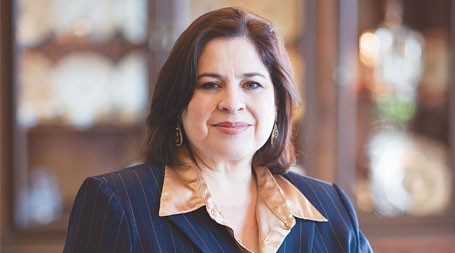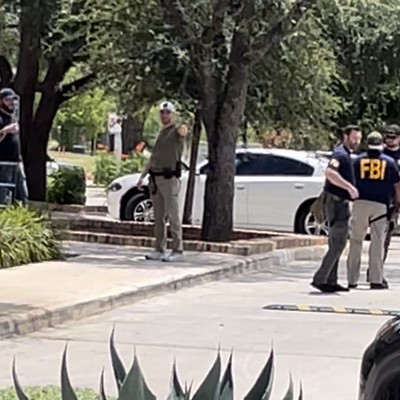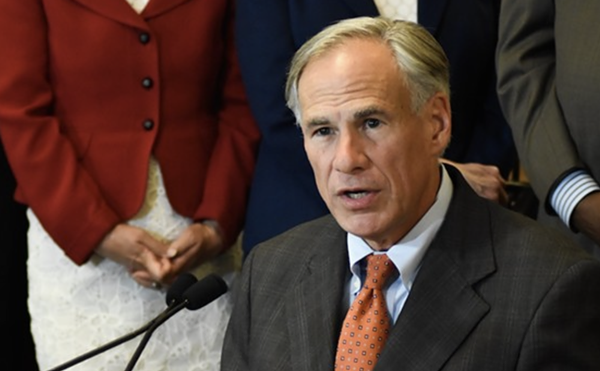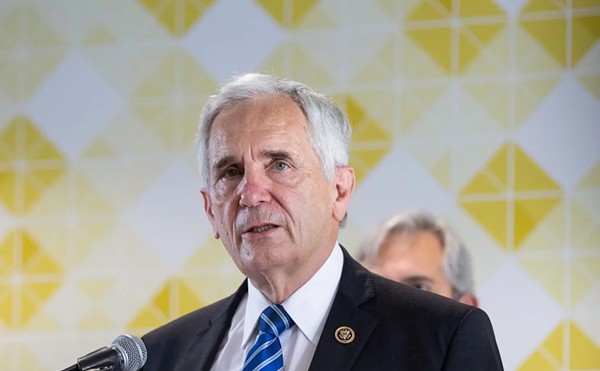The first thing you notice when you enter the waiting area of Leticia Van de Putte’s Capitol office in Austin is the abundance of gavels.
Soon enough, you zero in on other items: the sign on her office door that reads “Don’t Mess With Texas Women”; the picture commemorating Pope John Paul II’s visit to San Antonio; a basketball signed by the UTSA varsity squad; snapshots of Van de Putte smiling with Lyle Lovett and Willie Nelson; and the framed front page of the 1945 V-E edition of the San Antonio Light, featuring a large picture of Van de Putte’s mother, then a young child, and grandmother, on her knees in exultation, reacting to the monumental news.
But the gavels are the key mementos of this San Antonio pharmacist’s improbable 18-year career in the Texas Legislature, the last nine as senator for District 26. There’s a glass-encased gavel from the 75th Legislature, and various others scattered on bookshelves between trinkets and family pictures.
The most important gavel in Van de Putte’s collection, however, is the one that’s not here. It’s the gavel she pounded last August in front of an arena full of delegates and millions of TV viewers at the Democratic National Convention in Denver (and which Ted Kennedy touched when he addressed the convention). That gavel, which Van de Putte keeps in a satin-lined box in her San Antonio office, symbolizes what an astounding year 2008 was for her.
In January, she delivered the Spanish-language response to George W. Bush’s final State of the Union Address. In February, she block-walked on the West Side with Hillary Clinton. In June, she set the stage for Clinton’s withdrawal from the presidential sweepstakes by striking a unifying tone at the Texas Democratic Convention. The following week, she joined 11 other Latino leaders at a Washington meeting with Barack Obama to discuss his relationship with the Latino community.
In August, she co-chaired the third night of the national convention, bringing down the curtain on a night when Obama secured the Democratic nomination and Vice-Presidential nominee Joe Biden delivered his acceptance speech. In October, Texas A&M University Press published Latina Legislator: Leticia Van de Putte and the Road to Leadership, an examination by UTSA political-science professor Sharon Navarro of Van de Putte’s pioneering role as the second Latina senator in Texas history. In December, San Antonio mayoral hopeful Julián Castro publicly introduced Van de Putte as someone who “might be the next Democratic candidate for governor.” That same month, her office had to deny persistent rumors that Barack Obama planned to offer her a position in his administration. And Van de Putte herself has hinted that she might be open to a 2010 run for Kay Bailey Hutchison’s soon-to-be-vacant U.S. Senate seat.
Van de Putte, 54, seems to sense that this is her political moment, and she’s capitalizing on it with a flurry of legislative proposals — including tax exemptions for the sale and installation of solar panels — demonstrating a new-found urgency on environmental issues. She explains her legislative aggressiveness with a story about a “transforming moment” during a September 2007 visit with her then 3-and-a-half-month-old grandson, Julian, to the grave of her beloved grandfather.
“It was a beautiful day, early in the morning, and I had `Julian` in the carrier,” she says. “I noticed the baby was hungry, so I got the bottle and I was feeding him. A breeze comes through and then it hits me: ‘I am at my grandparents’ grave and I am holding my grandson.’ And it clicked. I had this huge feeling of responsibility and awe and total fear that in 20 years I may not be around.
“I know I’m not going to be around for the majority of this child’s life, even if I lead a very healthy life. My fear is that in 20 years he’ll say, ‘You were part of it. Why didn’t you invest, why didn’t you protect the environment?’ I just balled. I stayed there about an hour trying to compose myself, and saying, ‘Oh, my God!’”
Van de Putte says that shortly after her graveside epiphany, she began meeting with members of her staff, telling them that she hadn’t been vocal enough in pushing for change. She told them she needed “rock stars” who could work tirelessly and create legislative miracles. In response, Van de Putte’s staff members began calling her 2009 legislative proposals “the Julian Agenda.”
Van de Putte is such a boisterous, blunt speaker that some Republicans surely perceive her as a partisan flamethrower, but what’s striking about her, at close range, is her pragmatism about the legislative process. During a Wednesday afternoon office meeting with representatives from Voices for Children and Texans Care for Children, she talks about how she’s learned to sell education and green-energy programs to Republicans as economic, return-on-investment ideas, rather than as moral or environmental imperatives. When they talk about the federal-stimulus package then working its way through Congress, she sidesteps ideology and frames the issue this way: Texas taxpayers are paying their share for the plan, so why shouldn’t they reap their share of the funds?
“She’s been very effective, enough for us to keep electing her as our leader of the Democratic Senate Caucus,” says Texas Senator Mario Gallegos (D-Houston). “She’s the epitome of someone you’d want to represent you. She covers all the bases. She’s very cognizant of the people that elected her and brought her here.”
Navarro used Van de Putte’s career as a case study for Latinas in politics and says she was struck by Van de Putte’s open-mindedness and her recognition of the need to work with the opposition, as when she collaborated with Republican Representative Toby Goodman on legislation that opened up the state’s telecommunications market. “She is willing to listen to a variety of viewpoints. She understands the importance of keeping a dialogue on difficult issues,” Navarro says. “What impressed me was her ability, as a Latina politica, to lead in one of the most conservative state legislatures in the country.”
Gallegos remembers a phone call he received from Van de Putte in 2007, when Republicans were trying to muscle a controversial Voter ID bill (which Democrats argued would suppress voter turnout and amount to a de-facto poll tax) through the State Senate. Gallegos was recovering in Houston from liver-transplant surgery when it became obvious that his vote would be needed to block the legislation from debate.
“She said, ‘Mario, I know you just had the operation, I know you’re recovering, but we need 11 votes. I wouldn’t ask you if I didn’t think we needed it,’” he says. “I got up out of my hospital bed, and against my doctor’s orders I came down here. It was not only because Leticia asked me to, but because it was the right thing to do. But Leticia said it in just the right way. She’s a very hard person to tell ‘no’ — even if you’re in a hospital bed.”
Whenever Van de Putte’s husband Pete tells her that she demands too much from people who work for her, she inevitably reminds him that the stakes are much higher in her chosen career than in his. Pete owns the Dixie Flag Manufacturing Company, while Van de Putte has worked as a pharmacist for nearly 30 years.
“If they make a mistake, he’s going to lose a customer, he’s going to lose some profit, he’s going to make somebody unhappy,” she says. “I’m a pharmacist. If I make a mistake, I could kill somebody. So my level of performance and expectations for people not doing what they’re supposed to is sometimes what my husband says is unrealistic.”
She recalls, with a laugh, an encounter with a staff member who once told her, “Hey, I’m not perfect.” Van de Putte says she responded, “I don’t expect you to be perfect. I just expect you to do it better than anybody’s done it before.”
From an early age, Van de Putte placed similar demands on herself. Nicknamed “Chillona Berrinche” `crying tantrum` by her family, she loved playing football and basketball with neighborhood boys. During an office meeting with local representatives from the KIPP Aspire Academy, Van de Putte reminisces about playing basketball as a young child at the gym they currently use, and notes, with a tinge of regret, that because she went to school before the 1972 enactment of Title IX leveled the athletic playing field, Jefferson High School did not offer girls’ basketball during her years there. So she focused her competitive drive on student government, winning election as class president in her sophomore and junior years.
Van de Putte’s mother, Belle, worked as a choir instructor and helped develop mariachi programs for San Antonio schools. While Van de Putte’s talents always veered toward math, science, and athletics, she maintains an almost worshipful admiration for creative artists. She talks about her mother taking her to see opera singer Beverly Sills perform with the San Antonio Symphony, and recalls that her mother made a habit of putting butcher paper on the walls of their home, to encourage Leticia and her siblings to draw and paint.
“For me, the people who give me hope and encouragement are the artists: those poets, those writers, those musicians,” Van de Putte says.
One such musician was Pete Van de Putte, a young band director who worked closely with Leticia’s mother in the early ’70s. Pete and Leticia married in 1977, and two years later she graduated from the University of Texas College of Pharmacy. She worked for years on the West Side at Loma Park Pharmacy, and eventually bought the business. During this period, she also gave birth to six children and worked at the grassroots level for local Democratic politicians.
In 1990, when State Representative Orlando Garcia resigned to run for an appeals-court seat, Van de Putte, then a precinct chair for Garcia’s district, reluctantly threw her name into contention for the Democratic nomination for state representative. To the surprise of everyone, she emerged as the compromise choice of party leaders, and secured the nomination. It marked the beginning of a charmed political life, with Van de Putte cruising to a string of easy electoral wins, usually over negligible opposition.
Gallegos joined Van de Putte as a freshman representative in 1991. “My first impressions were that she was outgoing, with a great personality, obviously a good-looking woman, and, right off the bat, she let us all know that she was a mom,” Gallegos says. “So it definitely made a statement right away.”
The defining moment of Van de Putte’s political career came in 2003, when, as chair of the Senate’s Democratic Caucus, she led a group of 11 Democratic senators on a 45-day, quorum-breaking exile in New Mexico, to protest a Republican redistricting effort widely seen as a brazen gerrymandering power grab.
Van de Putte says that she was “mommy” for her fellow Democrats during those trying days. Early on, she informed them that they would make decisions as a group, but once those decisions were made, she would have full authority to plan the logistics. To prevent word from leaking about their trip to New Mexico, she kept her colleagues in the dark about their final
destination.
“Even with the pilots, I told them to file a flight plan for Amarillo. It wasn’t until we were about 10 to 15 minutes up into the flight that I told them ‘Albuquerque!’”
Although the Texas 11’s redistricting rebellion ultimately failed, it cemented Van de Putte’s reputation — for good or ill — as a significant figure in Texas politics.
GOP leaders bristled when she disclosed to the San Antonio Express-News that a Republican senator privately griped to her that if Senate Democrats acted “like Mexicans, you will be treated like Mexicans.” Republicans demanded that she reveal the name of the offending senator or retract her account. Ultimately, she retracted the statement and apologized. But the incident, coupled with Van de Putte’s public broadsides at “white Republicans,” convinced many on the other side of the aisle that she was a partisan pitbull prone to playing the race card.
On the other hand, her New Mexico stand made her a hero to national Democratic leaders. U.S. Speaker of the House Nancy Pelosi, then House Minority Leader, invited her to Washington to plan fundraisers for the Texas senators who’d incurred out-of-pocket expenses in Albuquerque. The two became good friends, and when Van de Putte became president of the National Council of State Legislatures in 2006, she made a habit of dropping by once or twice a month to see Pelosi at her Congressional office. Van de Putte delivered her response to George W. Bush’s 2008 State of the Union Address from Pelosi’s ceremonial office and Pelosi described her as “the great legislative leader from Texas” at a Denver press conference last August.
In 2007, Democratic Party Chairman Howard Dean called Van de Putte with an offer to co-chair the 2008 DNC, which she immediately embraced as an opportunity to follow in the footsteps of her Texas political idols Barbara Jordan and Ann Richards.
From the beginning of the 2008 presidential race, Van de Putte ranked among Hillary Clinton’s most vociferous backers. When Clinton came to St. Mary’s University’s Bill Greehey Arena last February, Van de Putte touted Clinton’s South Texas connections, and, by implication, ripped Barack Obama. “Hillary Clinton does not need a road map to get to our neighborhood,” Van de Putte shouted to a worshipful crowd. “Some people talk about ‘can’; Hillary talks about ‘will.’”
Less than four months later, with Obama’s victory secured in the Democratic sweepstakes, Clinton called Van de Putte and asked the Texas senator to join other prominent Latinos — including former San Antonio Mayor Henry Cisneros, Los Angeles Mayor Antonio Villaraigosa, and Miami Mayor Manny Diaz — at a private Washington meeting with Obama.
When Van de Putte’s time to speak came up, she informed Obama that she was already “75-percent onboard” with his campaign, but volunteered some constructive advice for his fall campaign. She told him he’d need to have Latino advisers in high-profile positions “and not just in immigration, or health and human services, or education.”
She recalls telling him: “When you come into our communities, no Sombrero Politics. Don’t come in, listen to a little bit of Latino music, take a couple of chips-and-salsa, speak a couple of words in Spanish, and then you’re gone. What we need is something sustainable, not fly-by-night.”
Finally, she emphasized that Latinos are not a monolithic bloc, noting that there are profound differences between Cubans in Florida and Chicanos in Texas or Puerto Ricans in New York.
“He listened and said that he planned to include more people, and that he was never going to do Sombrero Politics,” she says. “He and his campaign did everything they said they were going to do. Five days after that he sent out an email assuring us that they were putting $20 million, an unprecedented amount, in the Spanish-language media.”
Van de Putte became a unifying figure in the party, calling for healing at the state convention in June, and patiently talking down fellow Hillary enthusiasts when she addressed the Hispanic Caucus in Denver. If the argument can be made that Latinos represented the key to Obama’s electoral coalition, Van de Putte deserves some credit for mending the bitter rift between Clinton and Obama forces.
“The Democratic Party is about unifying people,” argues DeeJay Johannessen, co-founder of Taking Back Texas, a Dem-centric political-action committee. “She demonstrated that in her role last year.”
V an de Putte senses that the Obama phenomenon has swung the political pendulum at the state Capitol. She talks about Republicans, who previously blocked her legislative efforts, coming up to her this year and asking if they can sign on to her environmental and education proposals.
Her staff could serve as a walking advertisement for Obama Nation: young, idealistic, multi-cultural, with a strong female presence.
At a Senate Education Committee hearing, Van de Putte responds to testimony from charter-school reps by talking about a charter school for at-risk children that closed its doors for several weeks, and stresses the need to tighten up accountability at such schools. It’s a message she also conveys to representatives from the KIPP Academy when they drop by her office for their afternoon meeting. Later, she reveals to a contingent from Voices for Children that she and Republican Senator Kip Averitt plan to sponsor a child-health-insurance buy-in program that will cover families whose incomes exceed the poverty level.
At the end of the day, after hours of tightly scheduled meetings, she makes urgent calls to union leaders, attempting to ensure that T.T. Moreno, a retired firefighter and longtime labor activist who passed away earlier in the week, receives a proper firefighter’s burial. With this task completed, she’s finally ready to drive back to San Antonio, where she’ll attend Moreno’s rosary, and prepare for the weekend wedding of her son.
One of the books on Van de Putte’s office bookshelf is a study of Lyndon Johnson’s White House years, and the connection with Johnson goes beyond their shared Texas roots. Johnson was a formidable legislative presence and a magnetic personality with great powers of one-on-one persuasion. But he lacked confidence in his ability to sell himself on television or in front of large crowds.
Similarly, Van de Putte’s charisma doesn’t fully translate to television. In a small setting, she’s witty, engaging, passionate, and blessed with a remarkable command of legislative history and policy nuance. In larger settings, her passion comes through, but the appealing subtleties of her personality are not as apparent.
She all but concedes as much when she says, “I love the policy stuff, that’s what really drives me. I’ve had to get better at the politics. I wasn’t real good at the politics at the beginning.”
In recent years, Texas has been brutal to Democrats in state-wide races, and while Van de Putte points out that such a run would be easier for her now that her kids are grown (her youngest is a 19-year-old college student), she doesn’t seem particularly eager to leave the Texas Senate.
“If I can still have that passion in something else, then that’s what I’m going to do,” she says. “But, really, what drives me is my family and the kids. I’ve got great freedom. I have a wonderful district that’s allowed me to do stuff, and they’ve voted me in for another four years, and I’m going to use the voice.”
“We have several well-qualified candidates `for governor and senator`,” Johannessen says. “She’s served her constituency well and would be a good candidate.”
Gallegos believes that Van de Putte would alter the game in Texas simply by making a bid for higher office.
“She would get crossover voting, not only because she’s female, but because of the leadership role she’s taken all these years,” he says. “She brings a fresh outlook on things and I think that’s what people are looking for. There’s no doubt in my mind that if she decides to run for the U.S. Senate, or whatever position she decides to run for, that she’ll be able to get her share of the votes.” •
















